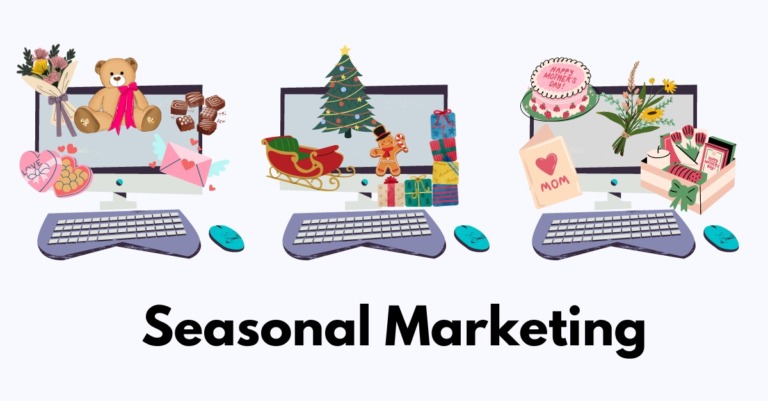Seasonal Marketing Strategy
When a new holiday approaches, marketers go all over the place to try and capture audiences’ attention, and as you may have noticed, love is in the air! That’s right, Valentine’s day is approaching, and this is no exception for marketers not to use this holiday to their advantage. Seasonal marketing is the application of techniques and platforms to advertise a brand, product or service around a particular holiday. This article will look at ways to leverage emotions to enhance your brand positioning and make your seasonal campaigns stand out from the rest. If you want to go more in depth about seasonal marketing, you can take a look at our article about Seasonal SEO.

Why apply seasonal marketing to your business?
During the holiday season, website traffic increases, giving your campaign more chances to make an impact. The advantage of more people buying online is that each digital encounter ought to give marketers more knowledge about what kinds of items and delivery alternatives consumers want, how they choose to make purchases, and other things. Your company doesn’t have to have a direct relation with the holiday to take advantage of this opportunity!
Tips and tricks
Your business may profit from seasonal SEO regardless of the goods or services of your industry. To get you started, we have included some tips that worked best for us.
Make a content calendar
Content calendars are essential for any business. Not only are they helpful in keeping track of what you share on social media, but it also gives you an overview of what content works best. By making an annual calendar for significant occasions, you will ensure that all significant occasions and holidays are scheduled for. Scheduling a long-term digital marketing strategy and evaluating where to add seasonal components will be crucial to nail the success of your campaign. Timing is critical; building anticipation is necessary which requires your content being prepared weeks in advance.
Identify seasonal keywords
While specific keywords are used year-round, others are only utilized during particular seasons. The idea is to choose long-tail keywords that are more precise (the phrases that searchers are using when closer to the point of purchase). Consider all holidays, events, and seasons that may be important to your specific audience when creating your seasonal marketing strategy.
Include your own touch
The best way to ensure your campaign’s success is to take a step back, look closely at your current campaigns and think of creative ways you can weave that particular festivity with your good, service or brand. Thinking about how you can position your marketing strategy to go together with a specific holiday can positively affect your audience’s emotions. Whether it’s Valentine’s Day or Christmas, your message and storyline should trigger emotions that go in accordance to enhance your brand. Keep your brand’s identity constant. Although displaying your holiday spirit is the objective, you also need to match your seasonal marketing with your brand design.
Connect with your audience
We previously mentioned how seasonal advertising affects website traffic and the economy, but we haven’t gone through the emotional impact you can generate. Many consumers look forward to the holidays and spend money on their loved ones. Businesses that grasp the nuances of this idea have unlocked tremendous potential and are to blame for some of the most sincere, emotive advertisements that successfully connect with target audiences. Seasonal events, after all, are the ideal opportunities to engage with new consumers and strengthen brand loyalty among current ones. With seasonal advertising, customers may feel more compelled to consider and purchase from your business.
Conclusion
An effective seasonal marketing strategy requires planning. Mark your calendars, make your plans and take note of the seasonal marketing’s time-sensitive nature. Launching your campaign too soon can backfire while starting it too late might make it less successful. Keep your brand identity present when planning your strategy and develop long-lasting relationships with your clients.
Paula de Leon Ramirez
Share
Recent Articles

Sustainable Marketing: Long term Sustainability Success
Previous Post Sustainable Marketing in the Digital World: Embracing Sustainability for long term Success In today’s digital era of constant connectivity, marketing has evolved into

Google Analytics 4. Collecting data in 2023
Previous PostNext Post Google Analytics 4 (GA4) and the new way of collecting data in 2023 In an era driven by data, businesses are increasingly

Communication in project management: easier said than done?
Previous PostNext Post Communication in project management: easier said than done? Communication is the foundation of Project Management. But, what is the ‘right’ way to
